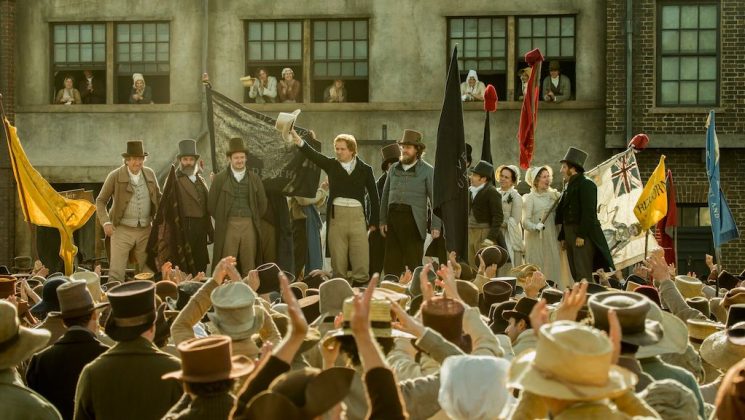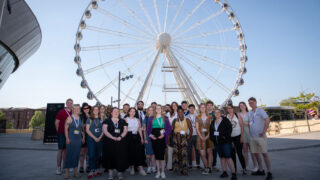Next year is the bicentenary of one of the most shameful episodes in English history – the Peterloo Massacre, in which 15 people were killed and hundreds seriously injured when sabre-wielding cavalry charged into a peaceful rally in Manchester, where working people were demanding the right to vote.
Before that, and serving as a rousing prelude to the anniversary, there’s Peterloo. The new film by celebrated director Mike Leigh recounts the events leading to the massacre as well as the terrible day itself, from both sides.
On one, there are the poverty-stricken working people of Manchester and the surrounding Lancashire towns, suffering the double whammy of appalling wages and the effects of the Corn Laws, which made a simple loaf of bread unaffordable; on the other, the ruling classes – from the Prince Regent and the government down to the local magistrates, who were petrified of the growing movement for reform.
It was the magistrates who, unnerved by the size of the crowd and contemptuous of the people’s demands, decided to send in first the yeomanry (who were said to be drunk) and then soldiers – stabbing, beating and trampling over the trapped assembly of men, women and children.
It’s a passionate, absorbing film, which is also deeply resonant. Two hundred years later, working people are still using the tools of mass rallies and petitioning to make their demands, while politicians continue to try their level best to ignore them.
Historian Jacqueline Riding, who worked as Mike Leigh’s historical adviser on the film, points out that while the government thwarted the 1819 campaign for political reform, “they couldn’t quell the habit that the labouring class had now developed, of gathering together to talk about politics and talk about reform.
“So even though the Peter’s Field leaders were arrested and imprisoned, the people were galvanised. There was the sense of a movement within the working class, which manifested itself later through the Chartist movement and the labour movement. And that couldn’t be crushed.”
Dr Riding had previously worked with the director on Mr Turner, his biopic of the artist JMW Turner. As head of the research department for Peterloo (“a department of one!” she jokes) she spent two years on the production, including four months of filming.
“There was so much immersion in the subject, which always happens with Mike’s films,” she says, “a lot of research which feeds into the character development, the look of the film, the themes, dialogue and so on.
“We had 150 actors who all needed individual assistance and information. I also supported the work of the costume, make-up, art departments, production design. But more than anything, my key role was as an extra brain for Mike.”
Spending hours in the government’s National Archives in Richmond (along with, at times, the actors and production designers), one of their primary sources was the Home Office Papers. These included the original letters sent by ministers to the local magistrates, advising them on what to do about the radical activity in the counties, the magistrates’ letters back, and the information sent by spies to Whitehall – all of which fed into speeches in the film.
“All the spy stuff is there too. ‘Intelligence’ as they called it,” she says enthusiastically. “People would turn up at reform meetings, listen, then go to the magistrates and file a report. A lot of the one-liners in the film, like cutting off the king’s head, come from these papers. It’s brilliant.”
Other sources included Hansard, local newspapers and radical pamphlets, and the written accounts of some 400 eye witnesses to the massacre.
“It’s a very rich field of history,” Dr Riding notes. So much so, that she’s now written a book to accompany the film. Peterloo: The Story of the Manchester Massacre covers not just that event but the national context in which it took place.
“The St Peter’s Field rally was deemed to be the regional apex of an increasingly mass gathering of people, to show the extent of support for the reform movement across the country, ratcheting up this vocal display towards reform of Parliament and the House of Commons.
“To think that Manchester had a population then of between 100-120,000 people. And on that day you had 60-80,000 people in one spot. You suddenly realise the scale of this meeting.”
That scale, as well as the good-natured intentions of the crowd (many families saw it as a novel excuse for a day out) are captured in the film, as well the appalling malice of the response.

When it came to filming the massacre, says Dr Riding, “watching the terrible events of the 16 August emerge, moment by moment, from the pages of history was both nerve-wracking and emotional.”
Such gatherings were known at the time as “monster meetings”, she says. The star speaker at Peter’s Field was the radical orator Henry Hunt, who had intended to follow it with an even bigger meeting in London. That never happened (in fact, Hunt would spend two years in jail). Nevertheless, some good came of the tragedy.
“Peterloo drew national attention to the plight of the working people of these industrial towns and cities, and the fact that they didn’t have any representation in Parliament whatsoever.
“There was also a demonstrable change in the attitude of the ‘middling sort’, if we can call them that [the middle class as such didn’t exist at the time] towards the working and labouring class, a new sense of fellow feeling. Suddenly they weren’t just a ‘mob’, they were individuals, human beings.
“And although there was no immediate political result, I would argue that this combination of fellow feeling with a sense of injustice over taxation without representation helped lead to the Great Reform Act in 1832, which was a move in the right direction.”
Dr Riding finds it astonishing that, of course, it took another 100 years before anything like full male suffrage occurred, and even longer for female suffrage.
“What this film is really impactful about is what people went through to get something like the vote,” she observes.
“So you would hope that people who have the vote now, which is all adult citizens of this country, would go out and use it – not just because of what our predecessors and ancestors did to get it, but because it’s their right.
“I don’t think there’s any circumstance of where a vote is wasted. In that sense I think this is a very powerful reminder of how simple but how extraordinary the vote is.”
Mike Leigh’s Peterloo is released nationwide on Friday 2 November. Peterloo: The Story of the Manchester Massacre, by Jacqueline Riding, is available in bookshops and online.


